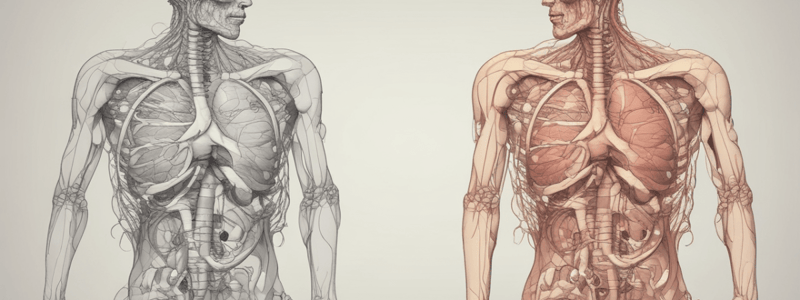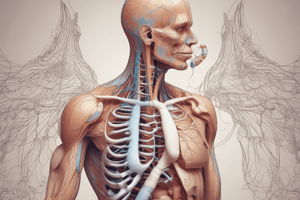Podcast
Questions and Answers
What triggers asthma symptoms?
What triggers asthma symptoms?
Allergies, viral infections, or air pollution
What is the main symptom of acute bronchitis?
What is the main symptom of acute bronchitis?
Cough
What is the primary cause of most lung cancer?
What is the primary cause of most lung cancer?
Smoking
Which bacteria cause tuberculosis?
Which bacteria cause tuberculosis?
What are common symptoms of tuberculosis?
What are common symptoms of tuberculosis?
What is the primary function of the respiratory system?
What is the primary function of the respiratory system?
Name the three major parts of the respiratory system.
Name the three major parts of the respiratory system.
Which parts are included in the airway of the respiratory system?
Which parts are included in the airway of the respiratory system?
What is the role of the diaphragm in respiration?
What is the role of the diaphragm in respiration?
Where does gas exchange take place in the lungs?
Where does gas exchange take place in the lungs?
How many times does an adult normally breathe per minute?
How many times does an adult normally breathe per minute?
Which part of the brain controls breathing?
Which part of the brain controls breathing?
What connects the pharynx to the trachea and contains the vocal cords?
What connects the pharynx to the trachea and contains the vocal cords?
What is the primary purpose of sports conditioning?
What is the primary purpose of sports conditioning?
What type of stress does conditioning and fitness impose on the body?
What type of stress does conditioning and fitness impose on the body?
Which components are usually included in physical conditioning?
Which components are usually included in physical conditioning?
Why do sportsmen and sportswomen put their body under stress?
Why do sportsmen and sportswomen put their body under stress?
In what types of training is physical conditioning often included?
In what types of training is physical conditioning often included?
How does regular physical activity affect the gut?
How does regular physical activity affect the gut?
Why is increasing blood flow important for digestion?
Why is increasing blood flow important for digestion?
What type of exercise is considered most beneficial for digestive health?
What type of exercise is considered most beneficial for digestive health?
How does drinking water help the digestive system?
How does drinking water help the digestive system?
Why is it better to choose mild to moderate exercise for digestive health?
Why is it better to choose mild to moderate exercise for digestive health?
What dietary change can improve digestive health?
What dietary change can improve digestive health?
What is the primary function of the digestive system?
What is the primary function of the digestive system?
Why does your body need the digestive system to function properly?
Why does your body need the digestive system to function properly?
How does the mouth contribute to digestion?
How does the mouth contribute to digestion?
What role does the esophagus play in the digestive process?
What role does the esophagus play in the digestive process?
What is the function of the stomach in digestion?
What is the function of the stomach in digestion?
What does the small intestine do in the digestive process?
What does the small intestine do in the digestive process?
How does the large intestine contribute to digestion?
How does the large intestine contribute to digestion?
What is the role of the rectum in the digestive system?
What is the role of the rectum in the digestive system?
What are the four components of basic fitness?
What are the four components of basic fitness?
What is the definition of strength in the context of fitness?
What is the definition of strength in the context of fitness?
How can overloading in strength training be achieved?
How can overloading in strength training be achieved?
What is the purpose of flexibility in fitness?
What is the purpose of flexibility in fitness?
List two methods of strength development mentioned in the text.
List two methods of strength development mentioned in the text.
What is the objective of endurance training?
What is the objective of endurance training?
Name the two types of endurance.
Name the two types of endurance.
Which type of endurance relies on energy production systems that supply the muscles with energy for contractions?
Which type of endurance relies on energy production systems that supply the muscles with energy for contractions?
Which type of training develops energy production systems to meet the demands of specific events?
Which type of training develops energy production systems to meet the demands of specific events?
What is the key chemical compound mentioned in the objective of endurance training?
What is the key chemical compound mentioned in the objective of endurance training?
Flashcards are hidden until you start studying
Study Notes
Respiratory System
- The respiratory system provides oxygen to the body and removes carbon dioxide.
- Three major parts of the respiratory system: airway, lungs, and muscles of respiration.
- Airway includes: nose, mouth, pharynx, larynx, trachea, bronchi, and bronchioles.
- Muscles of respiration include: diaphragm and intercostal muscles.
- Muscles of respiration act as a pump, pushing air in and out of the lungs during breathing.
- Normal respiration rate is about 16 times a minute in an adult.
- Breathing is controlled by the brainstem, regulating rate and depth of breathing based on blood carbon dioxide levels.
Respiratory System Parts
- Nasal cavity: where air enters the respiratory system.
- Pharynx: passageway for both food and air.
- Larynx: connects pharynx to trachea, containing vocal cords.
- Trachea: windpipe, carrying air from larynx to lungs.
- Lungs: two large, sponge-like organs with tiny air sacs (alveoli) for gas exchange.
- Bronchi: two tubes branching off of the trachea, carrying air to each lung.
- Bronchioles: small branches of the bronchi leading to the alveoli.
- Alveoli: tiny air sacs in the lungs where gas exchange takes place.
- Diaphragm: dome-shaped muscle separating the chest and abdominal cavities.
Respiratory System Conditions
- Asthma: inflamed and spasming airways (bronchi) causing shortness of breath and wheezing.
- Acute bronchitis: infection of the large airways, usually caused by a virus.
- Lung cancer: cancer affecting almost any part of the lung, often caused by smoking.
- Tuberculosis (TB): slowly progressive pneumonia caused by bacteria, symptoms include chronic cough, fever, weight loss, and night sweats.
Digestive System
- The digestive system breaks down food and provides energy to the rest of the body.
- Digestion is important for nutrients and staying healthy.
- Main organs of the digestive system: mouth, esophagus, stomach, small intestine, large intestine, and rectum.
- Each organ plays a role in breaking down and absorbing nutrients from food and liquids.
How Exercise Affects Digestion
- Regular physical activity stimulates the gut, preventing digestive problems.
- Exercise increases blood flow to all muscles, including those in the digestive system.
- Five tips to aid digestion: get moving, eat a healthy well-balanced diet, drink plenty of water, choose gentle exercises, and incorporate yoga.
Training Programme
- Sports Conditioning: conditioning and fitness is stress on the muscles to increase physical capabilities.
- Physical conditioning includes multiple components: power, strength, speed, balance, agility, coordination, and endurance.
- Basic Fitness: made up of four components - strength, stamina, flexibility, and speed.
- Strength: extent muscles can exert force by contracting against resistance.
- Stamina: muscles' ability to perform work continually.
- Flexibility: ability to achieve an extended range of motion.
- Speed: quickness of limb movement.
Type of Strength Training
- Muscle strengthening requires overloading beyond normal usage.
- Overloading achieved through: increasing repetitions, sets, or reducing recovery time.
- Types of strength training: weight training, circuit training, plyometric training, and hill or harness running.
Sports Conditioning
- Stamina or Endurance Training: developing energy production systems to meet the demands of the event.
- Two types of endurance: aerobic endurance and anaerobic endurance.
Studying That Suits You
Use AI to generate personalized quizzes and flashcards to suit your learning preferences.




